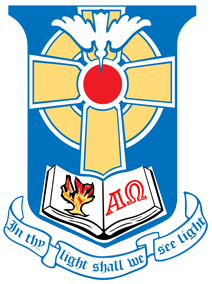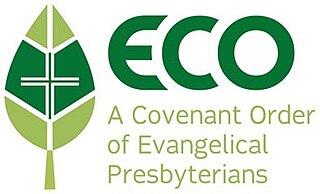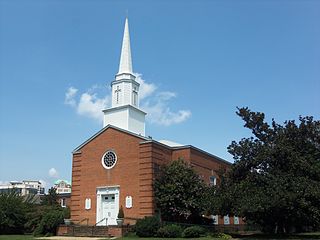History
| | This section is empty. You can help by adding to it. (July 2010) |
Synod of the Mid-Atlantic is an upper judicatory of the Presbyterian Church (USA) based in Richmond, Virginia. The synod oversees fourteen presbyteries in DC and five Mid-Atlantic states (Delaware, Maryland, North Carolina, Virginia, and West Virginia).
| | This section is empty. You can help by adding to it. (July 2010) |
There are fourteen presbyteries in the synod. [1]

The Presbyterian Church (USA), abbreviated PCUSA, is a mainline Protestant denomination in the United States. It is the largest Presbyterian denomination in the country, known for its liberal stance on doctrine and its ordaining of women and members of the LGBT community as elders and ministers. The Presbyterian Church (USA) was established with the 1983 merger of the Presbyterian Church in the United States, whose churches were located in the Southern and border states, with the United Presbyterian Church in the United States of America, whose congregations could be found in every state.

The Presbyterian Church in America (PCA) is the second-largest Presbyterian church body, behind the Presbyterian Church (USA), and the largest conservative Calvinist denomination in the United States. The PCA is Reformed in theology and presbyterian in government.

The Presbyterian Church in the United States was a Protestant denomination in the Southern and border states of the United States that existed from 1861 to 1983. That year, it merged with the United Presbyterian Church in the United States of America (UPCUSA) to form the Presbyterian Church (USA).

The Associate Reformed Presbyterian Church (ARPC) is a theologically conservative denomination in North America. The ARPC was formed by the merger of the Associate Presbytery (seceder) with the Reformed Presbytery (covenanter) in 1782. It is one of the oldest conservative denominations in the United States.

The Presbyterian Church in Canada is a Presbyterian denomination, serving in Canada under this name since 1875. The United Church of Canada claimed the right to the name from 1925 to 1939. According to the Canada 2021 Census 301,400 Canadians identify themselves as Presbyterian, that is, 0.8 percent of the population.

The Presbyterian Church in the United States of America (PCUSA) was a Presbyterian denomination existing from 1789 to 1958. In that year, the PCUSA merged with the United Presbyterian Church of North America. The new church was named the United Presbyterian Church in the United States of America. It was a predecessor to the contemporary Presbyterian Church (USA).

The Bible Presbyterian Church is an American Protestant denomination in the Reformed tradition. It was founded by members of the Orthodox Presbyterian Church over differences on eschatology and abstinence, after having left the Presbyterian Church in the United States of America over the rise of modernism.
Transylvania Presbytery is a member of the Presbyterian Church (U.S.A.), within the Synod of Living Waters. It oversees 67 churches (2022).

Synod of the Trinity is an upper judicatory of the Presbyterian Church headquartered in Camp Hill, Pennsylvania. The synod oversees sixteen presbyteries covering all of Pennsylvania, most of West Virginia, and a portion of eastern Ohio.
John Thomson or Thompson was born in Ireland and became a minister in the Presbytery of Philadelphia, later the Synod of Philadelphia. He served as a missionary in both Virginia and North Carolina, where he died a natural death in 1753. He is buried in the cemetery of Centre Presbyterian Church in Mooresville, North Carolina.
Synod of the Northeast is an upper judicatory of the Presbyterian Church (USA) based in East Syracuse, New York. The synod oversees 19 presbyteries in six New England states, two of the three Mid-Atlantic States, plus a non-geographical Korean Presbytery.

The Reformed Presbyterian Church of North America (RPCNA) is a Presbyterian church with congregations and missions throughout the United States, Japan, and Chile. Its beliefs—held in common with other members of the Reformed Presbyterian Global Alliance—place it in the conservative wing of the Reformed family of Protestant churches. Below the Bible—which is held as divinely inspired and without error—the church is committed to several "subordinate standards," together considered with its constitution: the Westminster Confession of Faith and Larger and Shorter Catechisms, along with its Testimony, Directory for Church Government, the Book of Discipline, and Directory for Worship.

The National Capital Presbytery is a judicatory of the Presbyterian Church (USA) based in Rockville, Maryland. The presbytery oversees 103 churches in two Mid-Atlantic states and the District of Columbia. NCP is a presbytery of the Synod of the Mid-Atlantic.
Abingdon Presbytery is a part of the Presbyterian Church (U.S.A.) and within the Synod of Mid-Atlantic. It consists of 48 congregations with a total of 2,475 members. The average number of members is 52, and the median is 27 (2022). The presbytery is named after a region in southwestern Virginia that includes 13 counties and the city of Abingdon, VA.
The Presbyterian Church of Nigeria is a church in Nigeria and subscribes to the Westminster Confession of Faith.

The Presbytery of Redstone is a Presbytery of the Presbyterian Church (U.S.A.) governing congregations in Westmoreland, Fayette, Somerset, and Cambria Counties in Western Pennsylvania. Its headquarters are located in Greensburg, Pennsylvania. It governs 67 congregations and 8,249 total congregants (2022).

ECO: A Covenant Order of Evangelical Presbyterians is an evangelical Presbyterian denomination in the United States. As a Presbyterian church, ECO adheres to Reformed theology and Presbyterian polity. It was established in 2012 by former congregations and members of the Presbyterian Church (USA), abbreviated PC(USA). Denominational disputes over theology—particularly ordination of practicing homosexuals as pastors and gay marriage—and bureaucracy led to the founding of ECO. In 2018, ECO has over 383 congregations, 103,425 covenant partners and over 500 pastors. ECO churches are egalitarian in beliefs and ordain women as pastors and elders.

Presbyterianism has had a presence in the United States since colonial times and has exerted an important influence over broader American religion and culture.

First Presbyterian Church of Arlington, Virginia, United States, is a congregation in the National Capital Presbytery, the Synod of Mid-Atlantic and the Presbyterian Church (USA).